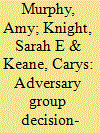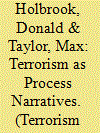| Srl | Item |
| 1 |
ID:
156901


|
|
|
|
|
| Summary/Abstract |
Anticipating whether an adversary group will continue to use their usual (“conventional”), expected attack methods is important for military and counterterrorism practitioners tasked with protecting the security of others. Conventional attack methods are by their nature easier to plan and prepare for whilst “innovative” methods may take those responsible for security and counterterrorism by surprise and, as such, may have more impact and more serious consequences. The present study aimed to develop understanding of how, when, and why adversary groups might decide to use conventional attack methods or opt to do something innovative instead. A literature review was conducted and findings were applied to develop a thorough understanding of the decision-making process that underlies an adversary group's choice of attack method. Identified are three stages preceding the execution of an attack: a) “strategic direction”; b) “incubation”; and c) “planning and preparation,” plus “overarching” and “contextual” factors that can influence the process at each stage. It is suggested that it is these factors and how they influence decision-making that result in innovative methods being used to execute an attack, or convention prevailing. Findings can aid practitioners and policy-makers in counterterrorism, security, and law enforcement, to support their understanding, evaluation, and countering of current and future threats.
|
|
|
|
|
|
|
|
|
|
|
|
|
|
|
|
| 2 |
ID:
169935


|
|
|
|
|
| Summary/Abstract |
Terrorism is a highly irregular form of crime where multiple factors combine to create circumstances that are unique to each case of involvement, or attempted involvement, in terrorist violence. Yet, there are commonalities in the way in which efforts to become involved unfold as processes, reflected as sequential developments where different forces combine to create conditions where individuals seek to plan acts of violence. The best way to frame this involvement is through analytical approaches that highlight these procedural dimensions but are equally sensitive to the nuances of each case. Analysing pre-arrest media usage of convicted terrorists, this paper focuses on the ways in which belief pathways and operational pathways interact in five distinct cases of terrorist involvement in the UK in what are termed “process narratives.”
|
|
|
|
|
|
|
|
|
|
|
|
|
|
|
|
| 3 |
ID:
172497


|
|
|
|
|
| Summary/Abstract |
Terrorists from a wide array of ideological influences and organizational structures consider security and risk on a continuous and rational basis. The rationality of terrorism has been long noted of course but studies tended to focus on organizational reasoning behind the strategic turn toward violence. A more recent shift within the literature has examined rational behaviors that underpin the actual tactical commission of a terrorist offense. This article is interested in answering the following questions: What does the cost–benefit decision look like on a single operation? What does the planning process look like? How do terrorists choose between discrete targets? What emotions are felt during the planning and operational phases? What environmental cues are utilized in the decision-making process? Fortunately, much insight is available from the wider criminological literature where studies often provide offender-oriented accounts of the crime commission process. We hypothesize similar factors take place in terrorist decision making and search for evidence within a body of terrorist autobiographies.
|
|
|
|
|
|
|
|
|
|
|
|
|
|
|
|